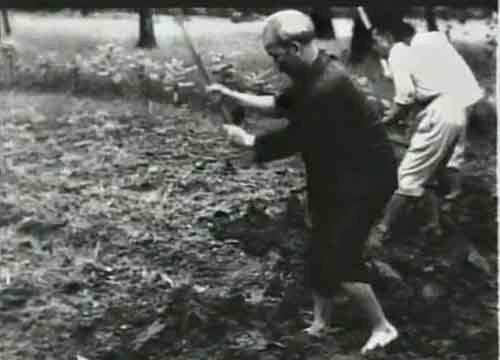(VOVworld) – Bui Dinh Hac has directed 4 documentaries about President Ho Chi Minh: “The song for Uncle Ho”, “Nguyen Ai Quoc and Lenin”, “The path to the homeland”, and “Ho Chi Minh, a portrait”. He said President Ho is an endless source of inspiration. Vinh Phong reports:
People’s artist Bui Dinh Hac was born in 1934 in Phu Tho province and began his cinematography career in 1953. He has won 10 first prizes at national and international film festivals with entries about President Ho. Hac said his films were a result of his love and admiration for the President. Hac recalled meeting President Ho at the Presidential Palace: “I was working at the studio and received the message that President Ho had asked us to screen a newly produced film at the Presidential Palace. That day, President Ho was receiving a number of pilots who had shot down American planes. I sat next to him during the one and a half hour film about Nguyen Van Troi. I was moved because I could feel his sentiments.”
Hac’s first documentary about President Ho was “The song for Uncle Ho”, which was produced after the 5th National Party Congress in 1976. Hac was inspired by the compliments of international delegates for President Ho. He finished the two documentaries “Nguyen Ai Quoc and Lenin” and “The path to the homeland” on President Ho’s 90th birthday in 1980. While filming “The path to the homeland”, Hac and his crew visited all the places President Ho visited on his 20-year journey to find a means national salvation. The documentary features a creative young man and a leader with a far-reaching vision. The documentary “Nguyen Ai Quoc with Lenin” features the period from 1923 to 1924 when President Ho was in the Soviet Union for the first time to attend international communist activities. Hac portrayed 33-year-old Nguyen Ai Quoc, who later became President Ho. Hac said: “When making films about President Ho, I was always worried because it was a huge topic. I had to search for historical documents and witnesses. When producing the film “Nguyen Ai Quoc and Lenin”, we had to determine when was the first time President Ho arrived in the Soviet Union. This detail was important not only for the making of the film but also for the compilation of Vietnam’s history and President Ho’s career. That day was also a milestone in the relationship between Vietnam and the Soviet Union, now Russia.”
 |
The filmmakers’ efforts finally paid off when they found the passport President Ho used when he was in the Soviet Union. Hac said: “When we were struggling with a lot of files and documents, we were very touched to find a passport with the name Nguyen Ai Quoc on it. There was a square seal by Petrograd Border Checkpoint confirming that he went through this checkpoint on June 30, 1923. I looked at the photo of President Ho who had a wide forehead and eyes of wisdom. This was a moment that I will never forget.”
On what would have been President Ho’s 100th birthday in 1990, Hac began to make the documentary “Ho Chi Minh, a portrait”: “In this film, we delved not into his political activities but into his concerns, feelings, and emotions to depict the personality of Ho Chi Minh.”
To produce this film, Hac and his crew reviewed many other documentaries to find the most valuable images of President Ho. He said: “It was like a holiday whenever we found a new image of President Ho. We were very moved when we found a photo of President Ho in an article by Russian poet Mandetan in 1923. Nguyen Ai Quoc sparked a culture, not that of Europe, but perhaps a culture of the future. Through his noble acts and voice, I could see tomorrow, the perspective of peace and fraternity around the world. I was most worried when I was covering his everyday activities and wondered if the images would touch the audience.”
Director Hac says the more he tries to depict President Ho, the more difficult he finds to fully portray his greatness and modesty. He says that President Ho and his moral example have been an endless source of inspiration to him and other filmmakers.